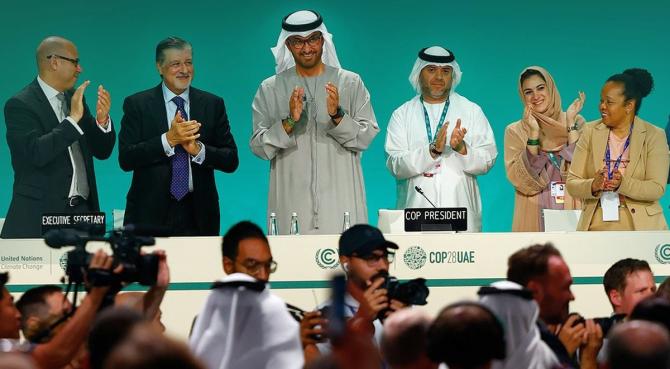Nearly 200 countries clinched a landmark climate deal that called for a transition away from fossil fuels, the primary reason for the climate crisis, in a "just and equitable" manner at the final session of the annual climate talks COP28 here on Wednesday.

Adopted after nearly two weeks of hectic negotiations, the first Global Stocktake deal, being termed the UAE consensus, urges countries to accelerate efforts toward the phase-down of unabated coal power, which is a climb down after India and China strongly resisted the singling out of coal.
As COP28 President Sultan al-Jaber gavelled through the agreement, the room full of negotiators at the annual Conference of Parties (COP) to the United Nations Framework Convention on Climate Change (UNFCCC) burst into applause.
Released in the wee hours, the text of the Dubai climate talks, the third draft after two were discussed threadbare and updated, called for a “deep, rapid, and sustained” reduction in planet-warming greenhouse gas emissions in line with 1.5 degree Celsius pathways in a "nationally determined" manner, taking into account the Paris Agreement and their different national circumstances, pathways, and approaches.
The historic document laid an eight-point plan to achieve this, including a "transition away from fossil fuels" in energy systems in a "just, orderly and equitable manner", accelerating action in this decade, to achieve net zero (balance between greenhouse gases emitted and removed from the atmosphere) by 2050.
The proposal urged countries to accelerate efforts toward the phase-down of unabated coal power, a marginal step up from the 2021 Glasgow deal.
However, unlike the previous versions, it lacks references to “limiting the permitting of new and unabated coal power generation.”
This absence suggests a strong pushback from heavily coal-dependent countries such as India and China.
Also, there is no mention of oil and gas in the 21-page document, fuels that rich countries continue to use.
Addressing the gathering after adopting the agreement, Sultan al-Jaber said this is a robust action plan which plans to keep 1.5 degrees within reach.
“It is a balanced plan that tackles emissions, bridges the gap on adaptation, re-imagines global finance, and delivers on loss and damage. It is a balanced plan that tackles emissions, bridges the gap on adaptation, re-imagines global finance, and delivers on loss and damage,” he said.
Avinash Persaud, Special Climate Envoy to PM Mottley of Barbados said when the dust settles and dawn breaks, this will be seen as one of the most historic COPs.
“We have operationalised a loss and damage fund, recapitalised the Green Climate Fund, and orchestrated an international climate finance system that prepares for new levies alongside emboldened development banks and new private sector flows. Today, we have committed to triple renewable investments and have a just transition from fossil fuels,” he said.
Noting that some activists were disappointed the text didn't commit to an “immediate fossil fuel phase out,” he said still, without the trade, investment, and finance to achieve it, it would either have hit developing countries hardest or been meaningless. “So meaningless that I saw some big developed country fossil fuel producers lining up to join that bandwagon before they had explained it to their electorates,” he added.
Sanjay Vashist, Director, Climate Action Network South Asia: “The outcome of COP28 makes it clear that the world only belongs to the rich and influential in developed countries.”
“The removal of equity and human rights principles from the final outcome text indicates that vulnerable communities in developing countries need to save themselves on their own and the real climate culprits are not coming to their rescue. We cannot celebrate the mere inclusion of the reference to fossil fuels in the text if it comes without means of implementation and finance for energy transition for poor and developing countries. If this is what a ‘historical outcome' looks like, then it is on the wrong side of history,” Vashist said.










